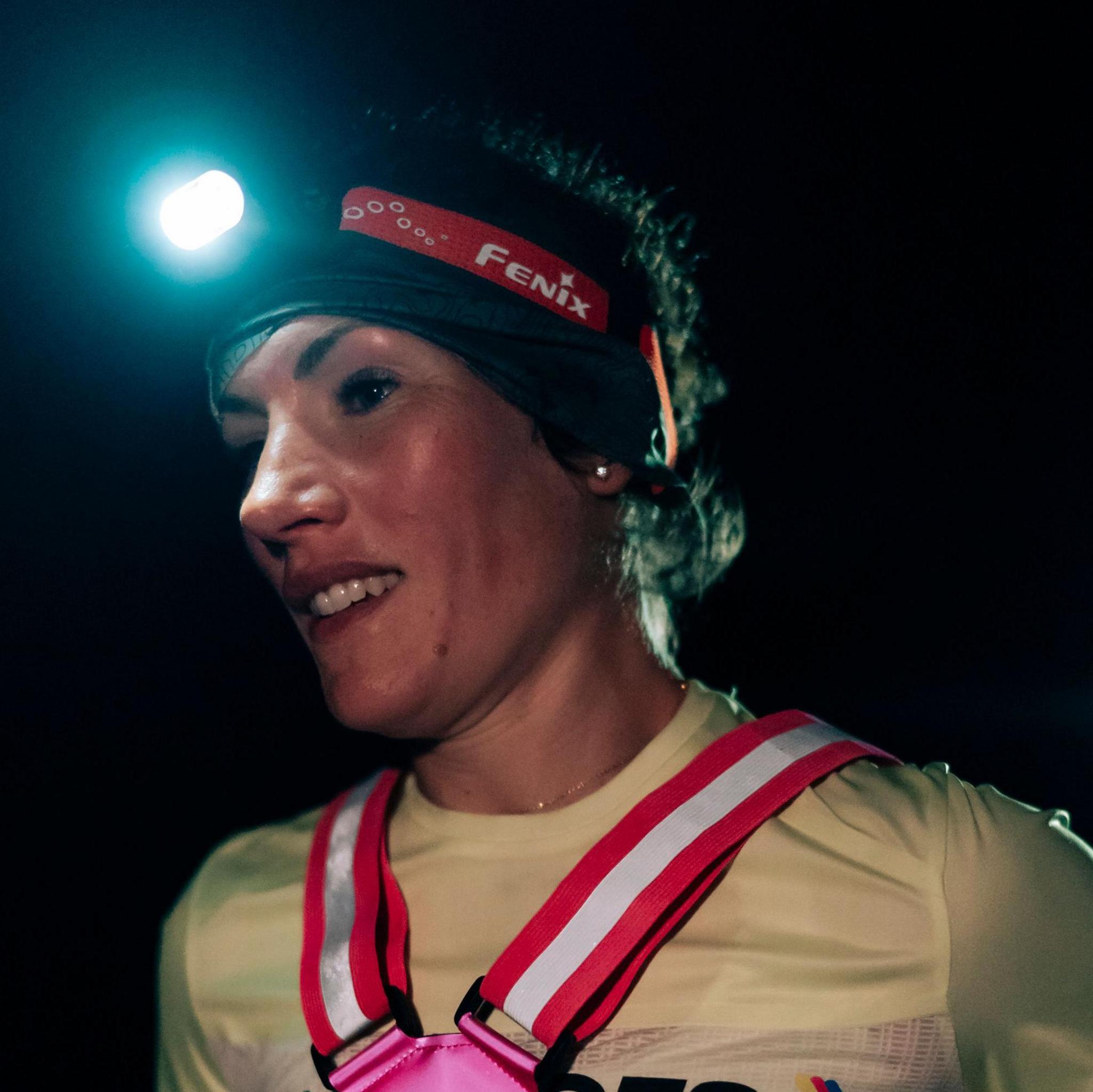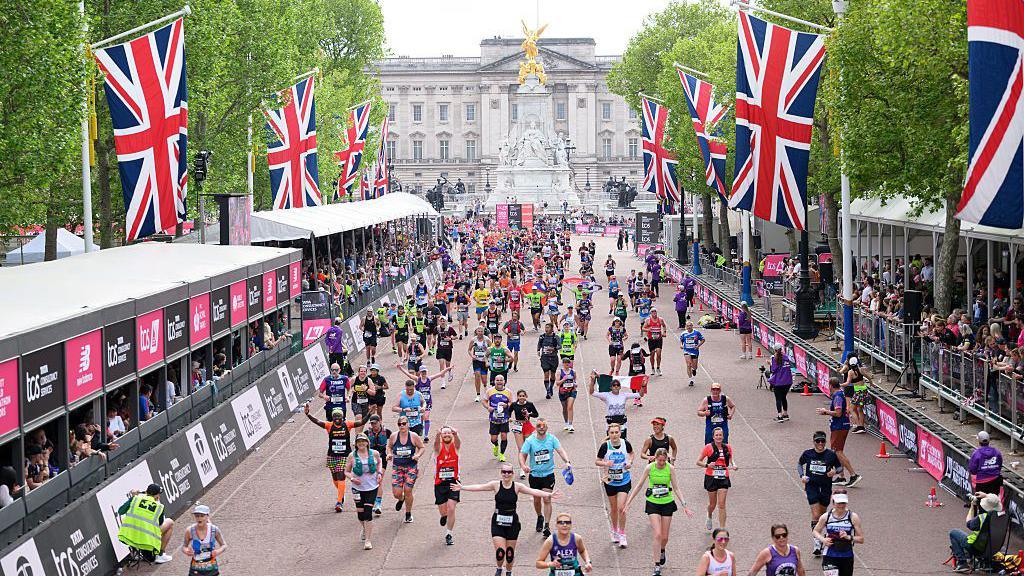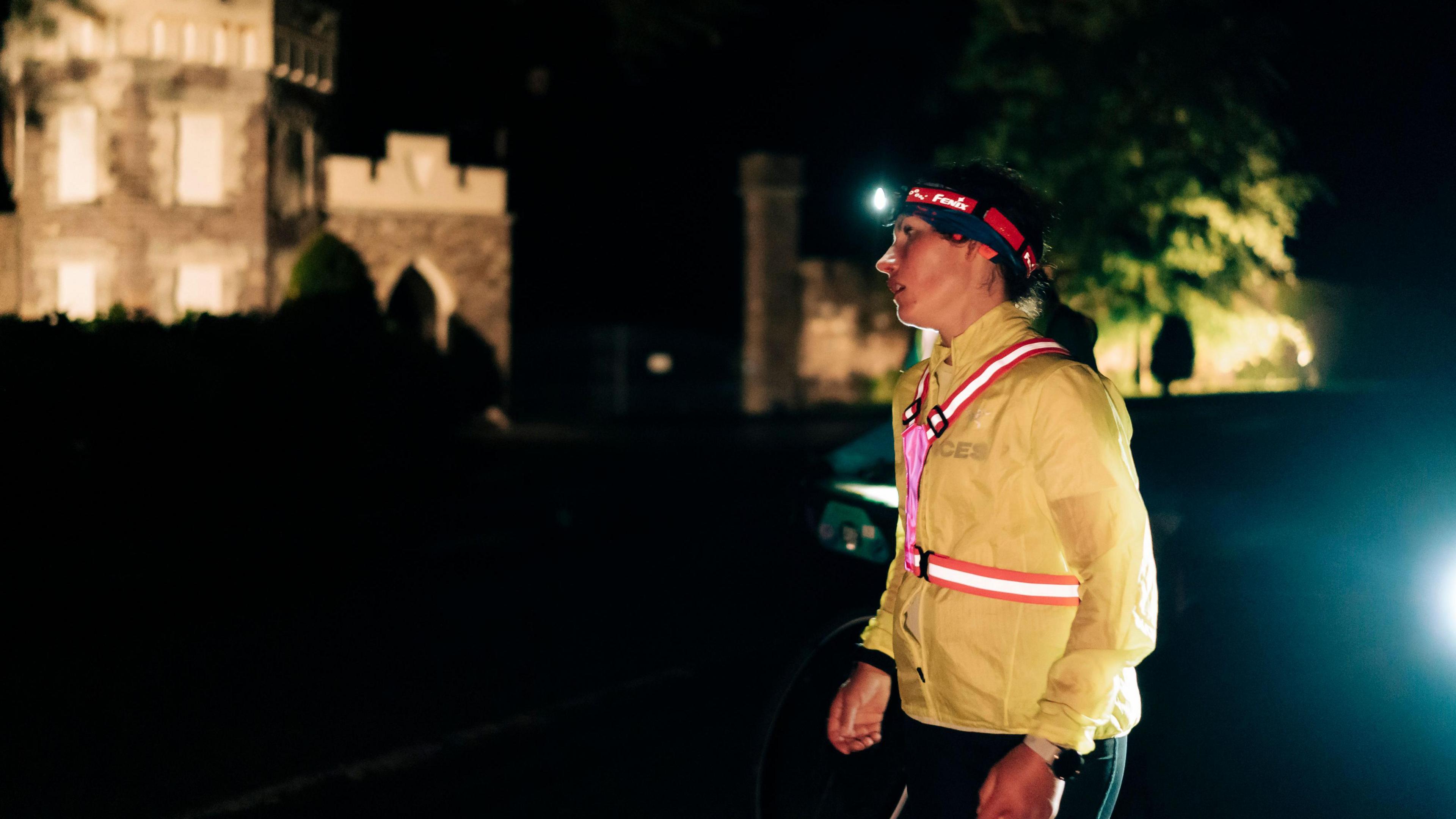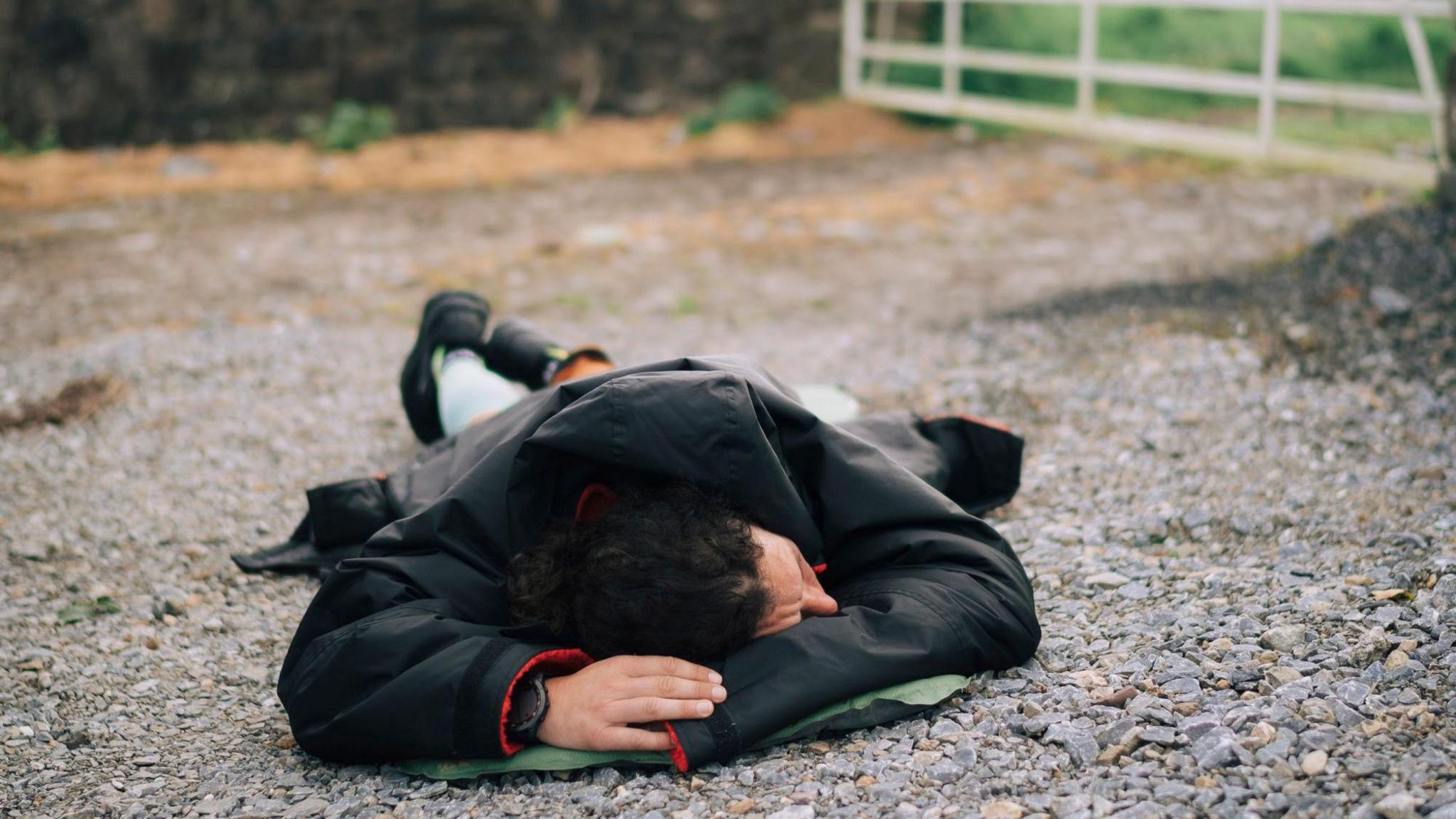
Sophie Power had not even laced up her trainers for her first run when she signed up to an ultramarathon.
But what was initially a fresh challenge after being made redundant has manifested into a life-changing passion that has led to positive change for women in sport.
In 2018, a photograph of Power breastfeeding her then three-month-old son during a 106-mile race went viral.
There had been no option for her to defer her place until she was fit to compete and it highlighted what she saw as a major issue facing women and mothers.
Now, many of the world's biggest events, including the London Marathon, have implemented pregnancy deferral policies and Power's work has been central to that change.
A starting dilemma
Power signed up for her first 250km (155-mile) ultramarathon at the age of 26, shortly after having been made redundant from her job in banking.
Although she was not a runner and never had been, a friend had recently completed the challenge himself and recommended she try it, as he believed she could have the stamina needed due to her time in the air squadron at university.
"I went for my first run the next day and realised pretty quickly that I loved ultra-running. I love being outside, the breadth of phenomenal people you meet [who] you wouldn't come across in everyday life," the 42-year-old, who lives near Guildford in Surrey, told BBC Sport.
"And really kind of pushing my body to the limits in a new way."
Immediately hooked, Power devoted her time to training and travelling to compete in stage races around world.
Shortly after the birth of her second child, Cormac, she was faced with a dilemma.
![Sophie Power [centre] celebrates with her children](https://ichef.bbci.co.uk/ace/standard/3840/cpsprodpb/9f07/live/aa0b8aa0-241d-11f0-b820-cb546c2ff766.jpg)
Power juggles her campaigning and ultrarunning alongside bringing up her three children
Having given up her entry to the iconic Ultra Trail du Mont Blanc (UTMB) race while she recovered from the birth of her first child, Donnacha, three years before, she was not prepared to do so again.
Like many races, UTMB had no pregnancy deferral policy at the time.
Despite not being able to run so soon postpartum, Power entered the 106-mile event with a view to starting and maybe walking the first 10km.
Yet 43.5 hours after setting off she completed the challenge, that included 10,000m of climbing, inside the cut-off time, walking the whole way except for a short stretch after one of the highest points when she was worried she might get hypothermia. She crossed the line with then three-year-old Donnacha.
That moment is one she looks back on with immense pride, though it was a photograph of her taken with her younger son that day that would inspire what followed.
The image that helped spark change
French photographer Alexis Berg was at UTMB photographing the 2018 race, as he is at many ultra events. And it was at one of the refuelling stations that he saw something he had never previously seen at one of these events.
"I knew it was unusual. At that moment it was impossible to realise the photo would have such an impact, but I just pushed one button that day and everything else that has happened is because of Sophie," he said.
What he captured was Power sitting down and breastfeeding her baby son during a break from the race.
"That photo has undoubtedly changed the course of my life. I worked out I should never have been on that start line," she said.
"I should have been given the opportunity to complete that kind of dream race when I was fit and healthy, not three months postpartum, trying to go 106 miles around a huge mountain by breastfeeding my baby. It was crazy."
![Sophie Power [right] breast-feeding her three-month-old baby](https://ichef.bbci.co.uk/ace/standard/3840/cpsprodpb/7edc/live/3a49e8f0-2419-11f0-9f6a-cdae3e54785e.jpg)
Alexis Berg's photograph of Power breast-feeding her three-month-old son, Cormac, at UTMB went viral in 2018
Power wanted to ensure returning mums did not face the same choice and put their bodies through the same risk as she had done.
She founded the charity SheRaces with the core aim of breaking down barriers preventing women from entering events alongside men and safeguarding returning mothers.
After the photo went viral, many male directors contacted her almost immediately to say they had added pregnancy deferrals to their programmes and expressed embarrassment that it was something they had not thought of before.
She engaged with more than 2,000 women to find out what prevented them from getting on the start line of races alongside men.
Her research went far beyond elite level sport. Power is not a professional athlete herself and her real passion is for other women and girls who had been like her.
"Girls drop out of sport at such a high rate. There's a massive dream deficit for girls compared to boys," she said.
Power believes a big reason for this is the language used when promoting sports and sporting events.
"It's 'hardest, toughest, baddest', and for a lot of women that's quite off-putting," she said.
"How do we redesign sport in a female lens? Can we make sure that the opportunities for girls are tailored to them, and what they want and sports provided in the right places in the right way?"
'Winning battles and driving change'
The result of her research was a set of nine principles that organisers could commit to in order to make their events more inclusive for women.
These included adapting the use of language and imagery on websites to reflect and appeal to female runners, changing cut-off times, providing female toilets, period products, changing facilities and event T-shirts made specifically for female entrants, rather than unisex ones for all, and a safeguarding and harassment policy.
Criteria for elite races includes equal exposure for the female race on social media coverage and prizes for female competition.
Power has seen change in some of the world's biggest races.
UTMB's policy, external since 2023 for some of its marquee events entitles those who are pregnant, have a pregnant partner or are adopting or birthing via surrogacy to a full refund and priority re-entry for up to five years.
But she says there is still a long way to go.
London Marathon 2025
Assefa sets women's record as Sawe wins men's race
- Published27 April
London Marathon breaks world record for most finishers
- Published28 April
'Finish lines not finish times' at London Marathon
- Attribution
- Published27 April

The London Marathon had a world record number of finishers in 2025, surpassing the previous record of 55,646 set by the New York Marathon in November
The New York, Boston and London marathons now all have pregnancy deferrals in place, yet mothers must pay the entrance fee for a second time when they use the deferral scheme, she said.
Her organisation's criteria requests races to implement a two-year deferral to allow people enough time to recover fully from their pregnancies.
"The majority of races are commercial, it's a business. If they can get more people on their start lines then they're going to do it and the purpose of the guidelines is they're almost non-cost. It's a no-brainer," she said.
"There are a lot of brands out there who say they are pro-women, yet they're sponsoring women's races that don't have pregnancy deferrals, that don't treat women equally.
"And then there are dinosaurs, they don't value the voice of female athletes.
"Then there are races that still need to make improvements, I put London Marathon in that bracket. They have listened to us, they are phenomenally inclusive, they've got loads of initiatives that they put out for diversity on their start lines, but they still want to make women pay twice for their place when they have a baby.
"I've definitely lost faith in some race organisers because of it but so many are changing and becoming better. You always feel like you fail at the battles you don't win but we're winning so many battles and driving so much change."
The London Marathon's policy, external allows entrants to defer for up to three years after giving birth. The event's organisers did not respond when asked why users of the deferral system must pay their entrance fee again.
What is Couch to 5k and how do I start?
- Published25 April
Pushing her body to new limits

Power suffered from hallucinations while on a world record-breaking ultramarathon across Ireland
As the scale of her work and its influence has grown, Power's propensity for testing her physical limits has grown with it.
She is now the holder of two Guinness world records - becoming the fastest woman to run the length of Ireland, last year.
Power completed the gruelling 340-mile route in three days 12 hours and eight minutes, smashing the previous record set by Mimi Anderson by more than three hours.
The route took her through Munster, where husband John was born, and to County Cork, where many of the Power family live, running through torrential rainfall, experiencing the early stages of sun stroke and sleeping for little more than two hours, while sustaining herself on a diet of jam-filled tortilla wraps, gels, chews and ice cream.
Her tongue was burned after two days of eating nothing but fruit and sweets. She pushed herself to the brink of total exhaustion.
"I was seeing nativity and Christmas scenes everywhere in this town. And all the trees had turned into plastic. The hallucinations were phenomenal, crazy," she said.
She has since gone on to set a second world record for the longest distance covered on a treadmill by a female in 48 hours and will be hosting her own women-only ultra races in the Peak District in August.
So how will she know when she has achieved what she set out to do?
"My ultimate goal for SheRaces is that we don't exist because it's not needed anymore and every woman is able to get on the start line," she added.
"Part of the reason I created it was to have something that wasn't just me and was owned by all women. We can all help each other and demand fairness."

Power completed the 84-hour Ireland challenge with just short 20-minute naps on the roadside